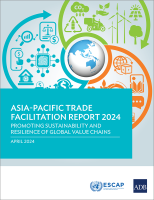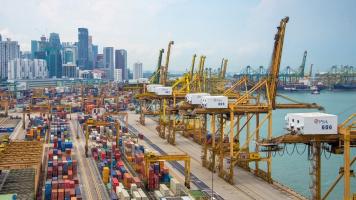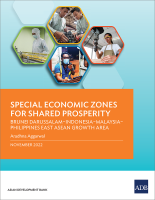
The region is expected to become the 4th largest economy by 2050, with the industrial sector contributing 37.5%, or more than one-third, of the region’s economy. Photo credit: iStock/EyeEm Mobile GmbH.
Favorable macro-trends are creating an opportunity for ASEAN to accelerate industrial cooperation through regional complementarity.
The Association of Southeast Asian Nations (ASEAN) is advancing cross-border industrial cooperation to solidify its position in global value chains amid geopolitical tensions and economic fragmentation.
On 26 May, ASEAN launched the Framework of ASEAN Industrial Projects Based Initiative. It promotes collaboration on high-impact projects that leverage regional complementarities, deliver tangible economic value, and develop regional industrial champions that are globally competitive. The initiative seeks to simplify the movement of goods and talent, harmonize regulations and technologies, and attract greater investment. The industrial sector includes manufacturing, shipping, infrastructure, and energy production.
Under the initiative, companies can participate in a cross-border project or become a supplier of products or services to a project. Incentives include tariff and non-tariff incentives and access to financing and human resources.
Poised for growth
Favorable macro-trends are creating an opportunity for ASEAN to accelerate industrial cooperation through regional complementarity, according to a brief on the industrial cooperation initiative.
The region is expected to become the 4th largest economy by 2050, with the industrial sector contributing 37.5%, or more than one-third, of the region’s economy. The sector is expected to grow at a compound annual rate of about 5% until 2030.
The shift of industrial supply chains into ASEAN is seen to unlock access to new markets and catalyze diversification into higher-value sectors. Collectively, ASEAN member states can establish regional industrial value chain projects via coordination and collaboration.
Eligible projects
The ASEAN Economic Community Council agreed to establish the framework during their 25th meeting in Jakarta in 2023.
The framework was developed through a series of national consultations and workshops involving relevant ASEAN sectoral bodies and private sector representatives, with support from the United Kingdom.
According to the brief, industrial firms in ASEAN can engage in two potential ways. They can apply as cross-border project originator to ASEAN via the originating country's ministry of commerce, industry, and/or trade. In turn, they can receive facilitation benefits under the framework, including improved talent mobility and enhanced intellectual property protection. Alternatively, they can become a service vendor or product supplier to projects or companies in ASEAN under the framework. This way, they can receive commercial benefits, including access to wider pool of potential customers from different ASEAN member countries.
The brief said eligible projects include those that face pertinent roadblocks in intra-ASEAN market access and regional integration. Those involving at least two ASEAN member states and contribute to regional economic growth and job creation are also eligible. The projects should also positively impact ASEAN's social and environmental ambitions.
Guiding principles
In the ministerial declaration establishing the initiative’s framework, the member countries set these guiding principles:
- Enhance engagement with the private sectors by providing real market insights, facilitating the resolution of existing market gaps, ensuring effective last-mile implementation and monitoring as well as evaluating the effectiveness of the projects’ implementation. The private sectors’ participation will be key in ensuring the most efficient and impactful outcomes.
- Foster a collaborative win-win mindset among ASEAN member states by identifying projects that align with the individual requirements and common interest of ASEAN member states. Creating mechanisms or procedures for coordination on troubleshooting, knowledge, resource, and cross-border technology cooperation will enable ASEAN member states to collectively address market access challenges that regional industrial projects tend to face.
- Ensure inclusive and equitable processes to foster broad-based participation by taking into account the diverse socio-economic interests and maturities of ASEAN member states in developing and implementing the initiative.
- Utilize existing ASEAN mechanisms to ensure immediate implementation. To ensure long-term impact, projects should be assessed and selected based on a set of eligibility criteria.

BIMP-EAGA
The Brunei Darussalam–Indonesia–Malaysia–Philippines East ASEAN Growth Area, or BIMP-EAGA, is a cooperation initiative established in 1994 to spur development in remote and less developed areas in the four participating Southeast Asian countries.


